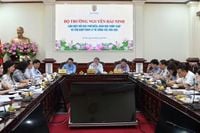The Provincial People's Committee of Ca Mau has recently made significant strides in enhancing legal aid for people with disabilities, as outlined in Plan No. 55/KH-UBND issued on February 25, 2025. This comprehensive plan aims to implement legal aid policies effectively, ensuring that individuals with disabilities receive the support they need to navigate legal challenges.
The initiative emphasizes increasing legal aid services, particularly in cases involving litigation. This focus is crucial as it seeks to protect the legitimate rights and interests of people with disabilities who may face legal barriers. The plan also highlights the importance of collaboration with various local agencies and organizations, including commune-level People's Committees, police, and disability associations, to facilitate access to legal aid.
One of the key components of the plan is the evaluation of the quality and effectiveness of legal aid cases, particularly those involving litigation. This evaluation process is essential for ensuring that the legal aid provided is not only accessible but also effective in safeguarding the rights of individuals with disabilities.
To further support these efforts, the plan includes a robust legal communication strategy aimed at educating individuals with disabilities about their rights and the legal aid available to them. This involves the distribution of 10,000 free informational materials that outline legal aid policies and provide guidance on how to request assistance when faced with legal issues.
Monitoring and guidance on the implementation of legal aid policies will be conducted closely to ensure that individuals with disabilities receive timely and effective support. Mr. Ngo Duc Binh, Deputy Director of the State Legal Aid Center in Ca Mau, stated, “We are committed to monitoring and guiding the implementation of legal aid policies to ensure that individuals with disabilities receive the necessary support.” He emphasized the importance of keeping case files up-to-date in their management software to enhance the efficiency of legal aid services.
However, challenges remain in the effective delivery of legal aid to individuals with disabilities. Issues such as limited opportunities for direct communication with those in need and a general lack of legal awareness among individuals with disabilities can hinder the effectiveness of these policies. The Department of Justice has signed coordination programs with various procedural agencies, including the Provincial Police and the Provincial People's Court, to improve legal aid services directly at the courts and during criminal investigations.
In addition to legal aid services, the Department of Justice actively engages with media outlets to highlight the results of legal aid activities and to raise awareness about the rights of people with disabilities. This includes organizing training sessions for legal aid providers to ensure they are equipped with the necessary knowledge and skills to assist individuals with disabilities effectively.
According to Mr. Nguyen Duc Hien, Deputy Secretary of the Provincial Party Committee, it is vital to provide comprehensive care and legal support to vulnerable groups such as individuals with disabilities and the elderly. He remarked, “Strengthening the implementation of legal aid policies for people with disabilities is crucial for protecting their rights.”
In a related development, discussions are underway regarding the establishment of a public lawyer system in Vietnam. As of March 31, 2025, the country boasts over 20,000 lawyers and more than 6,000 law practice organizations, reflecting a growing legal profession. Despite the absence of specific regulations for public lawyers, many attorneys are already engaged in activities that protect public interests, including signing contracts with state agencies for international dispute resolution and legal aid services.
The need for public lawyers has become increasingly apparent as various legal needs arise, particularly concerning the protection of government and public interests. The Department of Legal Support has proposed three models for establishing a public lawyer system in Vietnam. The first model suggests creating a system of public lawyers who work alongside private attorneys, potentially transitioning from existing legal advisors.
The second model proposes attracting private lawyers to participate in protecting public interests without forming a new team of public lawyers. The third model combines both approaches, establishing a system of public lawyers under a state agency while also incentivizing private lawyers to engage in public interest work.
At a recent conference, participants discussed the necessity of creating a public lawyer institution and the proposed models. Lawyer Tran Tuan Phong, Chairman of the Vietnam International Commercial Lawyers Club, emphasized the importance of clarifying the roles of public and private lawyers. He noted, “It is essential to define the scope of practice for public lawyers clearly, as they will serve as state representatives, while private lawyers will operate in the market.”
Mr. Dang Ba Bac, Deputy Director of the Department of Justice in Quang Ninh province, highlighted the urgent need for public lawyers in local contexts, citing their previous use in the region. He proposed models for public lawyers, including a bidding system for legal services and organizations dedicated to public interest protection at the provincial level.
While there is a consensus on the necessity of public lawyers, some participants stressed the importance of establishing clear mechanisms for their formation and ensuring that they are equipped to meet the demands of legal development and international integration. The scope of public lawyers' work should include protecting vulnerable groups as mandated by the state and participating in the implementation of laws and policies.
In conclusion, the initiatives in Ca Mau and the discussions surrounding public lawyers represent significant steps toward enhancing legal support for individuals with disabilities and ensuring that public interests are adequately protected in Vietnam's evolving legal landscape. As these efforts progress, it remains crucial to monitor their effectiveness and ensure that they meet the needs of those they are designed to support.




